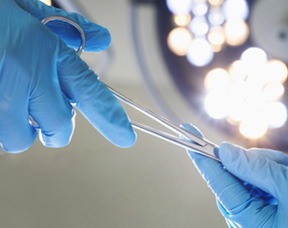An Orchiectomy is simply the surgical removal of one or both of a prostate cancer patient’s testicles. An Orchiectomy is performed to cease the production of testosterone which prostate cancer in order to continue to develop. An Orchiectomy is not a cure for prostate cancer but may help in relieving symptoms, preventing complications, and prolonging survival for a patient with advanced prostate cancer.
Two types of Orchiectomy
Simple orchiectomy:
Is the complete removal of both testicles and is used as a as palliative treatment for advanced prostate cancer. The patient’s penis is taped to their abdomen and an anesthesia is administered which can either be local or epidural. The surgeon will then make small incision in the scrotum midpoint as well as through any underlying tissue. The testicles are then removed along with portions of the spermatic cord. The incision is then close sutured with at least two layers of sutures. The patient can also request prior to the procedure to have prostthtic testiscles inserted following the orchiectomy in order to give the aesthetic appearance of a normal scrotum.
Subcapsular orchiectomy:
This procedure is similar to the simple orchiectomy the only difference being however is that only glandular tissue where testosterone is produced is removed from the lining of each testicle without having to remove the glands.
What are the Orchiectomy Side Effects?
Orchiectomy is relatively low-risk procedure that does carry side effects following the removal of both testes and the decrease in testosterone. Side effects include:
- Sterility
- Decreased interest in sex
- Erectile dysfunction
- Hot flashes
- Larger breasts (gynecomastia)
- Weight gain
- Decrease in muscle mass.
- Osteoporosis
- Fatigue
Removal of the testicles is just one way to reduce testosterone levels in the body and taking medications is another. Take the time to talk with your doctor and carefully consider your options before deciding on a orchiectomy. The side effects of the procedure can be treated but they are permanent.


